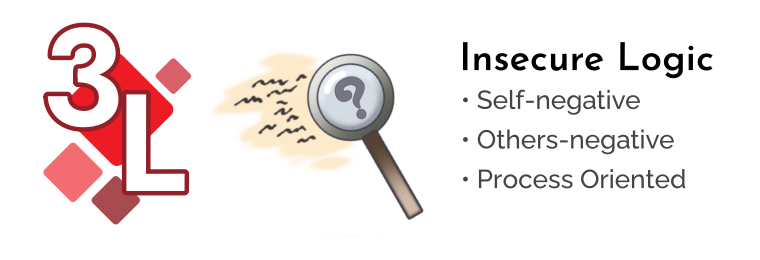
The 3L attitude is characterized by a self-negative (Ls-) and others-negative (Lo-) disposition. This disposition creates an attitude that is plagued by an awareness of limitations, weakness, harm, negative consequences, and manipulation within the realm of logic. This awareness applies internally, externally, and within the exchange of information in the aspect. 3Ls have a keen sense of how they can be harmed by logic. The strategies that each 3L employs to deal with the insecurity may differ in behavior or execution but the core attitude of subjective vulnerability and insecurity will remain consistent for all 3Ls. Below are some common beliefs and behaviors that you may see with 3Ls. Please keep in mind that these are generalities and do not represent the vast sub-archetypes held within the overall 3L attitude.
Dichotomies
Uncertain • Insufficient • Weak • Aggressive • Subjective • Vulnerable • Wordy • Expansive • Universal
Inner Conflict
• Very skeptical of all logical thought.
• May spiral into anxiety when thinking about intellectual pursuits.
• Unsure of the best way to organize information and ideas in order to get it across in a way that accurately expresses their ideas.
• May choose to obsess over formal logic or reject it all together.
• Worry about the underlying meaning of the conceptual.
• Feel anxiety when they make their academic work public.
• When speaking, can overemphasize odd and out of place words.
• Often have a fascination with foreign language but insecurity in expressing thoughts outside of their native tongue.
• See the underlying negative possibilities that others ignore or miss.
Reactive Phase
• Prefer to aggressively engage with others about the tenets of logic, pushing for answers and arguments.
• Tend to spend hours rewriting any sort of opinion piece until it is exactly correct.
• Can get pulled into zealotry and aggressive ideology as a place-marker for lack of assured logical thought. Loudly question everything that is communicated as fact or truth.
• Prone to suspicion and distrust popular sources of information, sometimes believing in conspiracies.
• Question others explanations as if they are wrong by default and need more processing.
• Become overly explorative and obsessed with voicing their opinions at every chance possible.
Dormant Phase
• May disconnect due to feeling trapped when expected to offer in depth explanations.
• Can be very sensitive to criticism of their ideas and being told they are incorrect which leads to isolation.
• Have a distrust of others understanding their own concept of reality.
• Prefer to check in with others rather than openly assert their opinions.
• Have a hard time trusting that they can effectively communicate their ideas to others.
• May become trapped in negative thought loops, so they detach from thinking about logic all together.
• Have a hard time trusting their memory when it comes to detailed logic which can lead to repetition and obsession.
Secure Phase
• Feel comfort in learning and applying their logic with no fear of criticism.
• Come to understand that their ideas are useful and will develop and improve over time.
• Can accept that they are fallible and make mistakes when it comes to academic pursuits.
• Become accepting of those who make themselves an authority on a subject or idea.
• Refuse to over-analyze subjects and rather let ideas speak for themselves rather than obsessing.
• Learn how to empathize with those who heavily criticize their ideas and intellectual pursuits.
• Adopt curiosity and wonder rather than being held back by insecurity.